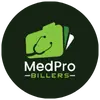- Serving Santa Ana & Surrounding Areas
- Available 24/7

Discover comprehensive solutions tailored to meet your needs. Our expert services are designed to help you thrive and achieve your goals with confidence.
Medical billing ensures accurate and timely reimbursements for healthcare services by managing claims, reducing administrative burdens, and improving revenue cycle efficiency through error minimization and prompt payment follow-ups.
A billing audit reviews billing records to ensure accuracy and compliance, identifying discrepancies, errors, and revenue loss, helping improve claim submissions and coding practices for better financial outcomes.
RCM oversees the financial lifecycle from patient intake to payment, managing coding, claims, and payment processing, ensuring accurate and timely reimbursements while reducing revenue loss and inefficiencies.
Patient scheduling optimizes healthcare operations by coordinating appointments to reduce wait times and balance provider workload, improving care, reducing no-shows, and increasing clinic productivity.
Prior authorization ensures that treatments, procedures, and medications are approved by insurance providers, ensuring medical necessity, managing healthcare costs, and preventing unnecessary treatments.
Patient customer services enhance healthcare by offering support with inquiries, scheduling, and billing issues, improving patient satisfaction through timely, accurate information and personalized care.
Eligibility verification checks a patient’s insurance coverage before treatment, ensuring accurate knowledge of coverage limits and out-of-pocket expenses, reducing unexpected costs for both patients and providers.
Lab billing handles financial processes for diagnostic tests, coding claims, and ensuring timely reimbursement while adhering to complex regulations to minimize claim denials and delays.
Radiology billing manages coding and claim submission for imaging services like X-rays and MRIs, ensuring accurate claims and timely reimbursements for radiological procedures.
Ambulatory billing manages outpatient services like surgeries and urgent care by coding procedures and submitting claims, ensuring timely reimbursement and accurate patient billing.
MIPS and MACRA affect healthcare reimbursement by evaluating provider performance through metrics like quality, cost, and improvement activities, ensuring fair compensation based on services rendered.
Transcription billing involves coding and submitting claims for transcribing medical consultations and procedures, ensuring timely payments for transcription services.
Dental billing manages claims for dental procedures, ensuring accurate coding and patient billing, reducing claim denials, and ensuring providers are reimbursed on time.
Credentialing verifies healthcare provider qualifications, ensuring compliance with regulatory standards, enhancing trust with patients, insurance companies, and healthcare institutions.
Medical billing services are essential for healthcare providers to ensure accurate, timely reimbursement for their services. By managing the complex processes of claims submission, follow-up, and payment posting, these services help reduce administrative burdens, minimize errors, and enhance revenue cycle efficiency.
Laboratory billing is a specialized aspect of medical billing that focuses on managing the financial processes associated with diagnostic testing and laboratory services. This involves coding and submitting claims for lab tests, ensuring accurate reimbursement from insurance providers, and handling patient billing and collections. Effective laboratory billing requires a thorough understanding of complex coding systems, payer-specific requirements, and regulatory compliance to avoid claim denials and delays.
Radiology billing is a specialized area of medical billing focused on managing the financial aspects of radiological services, including the interpretation and reporting of diagnostic images like X-rays, MRIs, and CT scans. This process involves accurate coding of radiological procedures, ensuring that claims are properly submitted to insurance companies and that reimbursement is received in a timely manner.
MIPS (Merit-based Incentive Payment System) and MARCA (Medicare Advantage Risk Adjustment) are critical components of healthcare reimbursement that impact how providers are compensated for their services. MIPS is a performance-based program under the Quality Payment Program (QPP) that evaluates healthcare providers based on quality, cost, improvement activities, and promoting interoperability.
Transcription billing involves the financial management of services related to converting audio or video recordings of medical consultations, procedures, and reports into written text. This process includes accurately coding and billing for transcription services, ensuring that claims are submitted correctly to insurance providers and managing patient billing.
Dental billing services play a crucial role in managing the financial aspects of a dental practice, ensuring that providers receive accurate and timely reimbursement for their services. This involves coding and submitting claims for dental procedures, handling insurance verifications, and managing patient billing and collections. Effective dental billing requires expertise in dental coding, familiarity with various insurance plans, and compliance with regulatory standards to minimize claim denials and delays.
Provider credentialing is a vital process in the healthcare industry that involves verifying and validating the qualifications, experience, and professional standing of healthcare providers. This process ensures that physicians, nurses, and other healthcare practitioners meet the necessary standards set by regulatory bodies, insurance companies, and healthcare institutions.